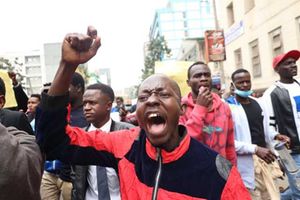
Education Cabinet Secretary Julius Migos Ogamba appearing before the Senate Committee on Education at Bunge Tower Nairobi on December 5, 2024.
Students in public universities who were under the funding model that was quashed by the High Court are unsure how they will be funded for the second semester of the current academic year.
Following the December 16 court decision, the government gave a notice of appeal but has not yet filed a substantive case at the Court of Appeal.
The court’s verdict affects first and second year students who had received loans and tuition fees for just the one semester. The second semester will start in January 2025.
The model was introduced in 2023 where students are awarded money for upkeep by the Higher Education Loans Board (HELB) while tuition fees was paid directly to universities (scholarships) by the Universities Fund (UF). However, the funding is not automatic and students have to apply.
The Nation has established that Education Cabinet Secretary Julius Ogamba has appointed a committee to look into the crisis and suggest ways of funding the students.
The committee comprises officers from the ministry as well as semi-autonomous government agencies (SAGAs).
The case against the model was filed by the Kenya Human Rights Commission (KHRC), Boaz Waruku, Elimu Bora Working Group and the Students’ Caucus. The courts are on recess until January 12, 2025.
“Nothing has been vacated and so the status quo remains. The government needs to execute funding matters within the Helb Act as directed by the court,” Mr Waruku told Nation.
“The government should find ways of funding universities because they have allowed for non-compliance by the vice chancellors that they appointed.”
The court determined that the Variable Scholarship and Loan Funding Model is discriminatory and violates students’ legitimate expectation.
It also ruled that the model is unconstitutional because it was implemented without proper public participation.
“An order of prohibition is hereby issued prohibiting implementation of the Variable Scholarship and Loan Funding Model until the government complies with constitutional and legal requirements where necessary,” reads the ruling by Justice Chacha Mwita.
Prof Daniel Mugendi who chairs the Vice Chancellors Committee confirmed that the special committee has been meeting but has not yet come up with a concrete proposal on how to fund students as well as the universities.
“It hasn’t been decided but we’re discussing and probably the CS will give a statement soon.
The committee is meeting to make a decision and they will meet again on Monday, January 6, 2025,” said Prof Mugendi who is also the VC of the University of Embu.
“We’ll also go to the Court of Appeal to seek stay orders as we see what to improve in the funding model so as to comply with the law. But, as we do that, we need to be operating.”
The SAGAs involved in the ministerial committee include representatives from public universities, the UF, HELB and the Kenya Universities and Colleges Central Placement Service.
“The second semester begins on January 6 but there will be no money released [under the funding model] because of the court ruling,” said Prof Mugendi.
The funding model has faced challenges since it was introduced.
President William Ruto in September appointed a committee to review it but its term lapsed before it presented its recommendations and has now been overtaken by the court ruling.
Students have particularly been opposed to the categorisation into five bands based on their economic status as determined by a means testing instrument.
During the court process, the government argued that it can no longer fund universities using the differentiated unit cost (DUC) model due to inadequate resources.
The government capitation under the DUC had fallen from the expected 80 percent of tuition fees to 48 percent by the time the new funding model was introduced. With another cohort of students expected to join university in 2025, the government will require a bigger budget for higher education.









